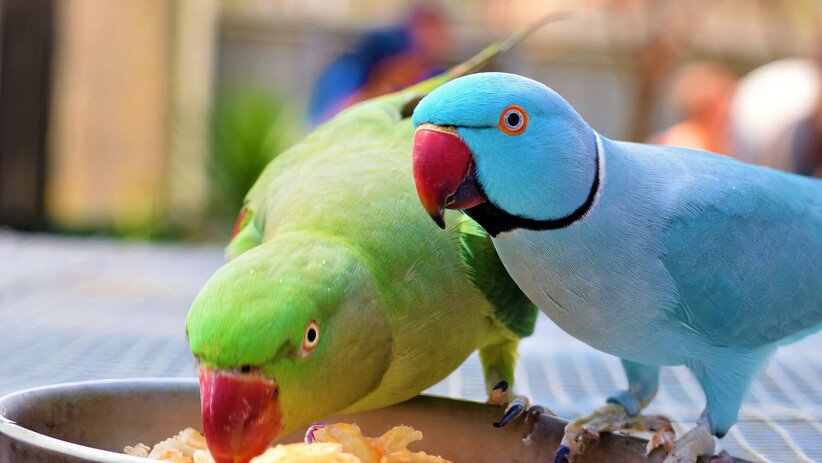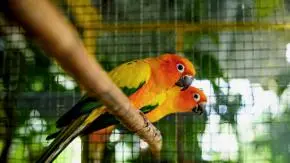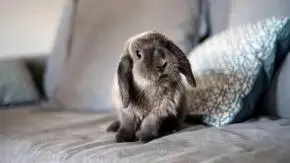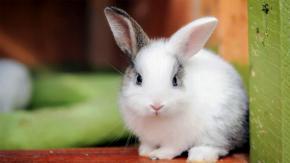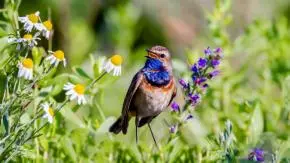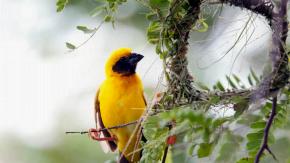Parrots are undeniably intelligent and social creatures. In their natural habitat, they live in flocks of many birds, their own kind. These flock animals constantly interact with each other, preen each other’s feathers, play together, and forage for food as a group.
Keeping a pet bird separate from other birds can leave them feeling lonely and lacking in social interaction. This is where the question “Does my parrot need a playmate?” comes in.
This blog post explores the social needs of pet birds and the potential benefits of introducing another bird into their lives.
We’ll delve into the importance of addressing their social needs and the factors to consider when introducing a new bird, like whether it should be the same species (like an African Grey with another African Grey) or a different species altogether (think sun conure and cockatiel).
Understanding Parrot Behaviour
In the wild, parrots live in flocks and exhibit complex social behaviours. These intelligent birds thrive on interacting with their own species, forming strong bonds with their mates and engaging in play, mutual preening, and quarrelling.
However, parrots may struggle to adapt to life without their flock when kept as pet birds in captivity.
Many parrot owners wonder if their feathered friend needs a companion. While some species, like cockatiels or budgies, do well as single birds, others, like macaws or cockatoos, are likelier to become lonely or depressed without a friend of the same species.
Excessive screeching, feather-plucking, or aggressive behaviour towards humans or other pets in the house are signs that your pet parrot may be craving social interaction.
If you’re considering adding a new bird to your family, it’s important to do your research. Introducing two birds of different species or sizes can be risky, as the larger bird may bully or even injure the smaller one.
When introducing birds of the same species, it’s best to choose a pair of the same sex to avoid unwanted breeding. Provide separate cages for each bird, but allow them to interact in a neutral play area under supervision.
Remember, parrots are highly intelligent creatures with complex social needs.
While they can form strong bonds with their human flock, they also require plenty of mental stimulation, a varied diet, and enough time to rest, eat, and play.
Benefits of Having a Parrot Playmate
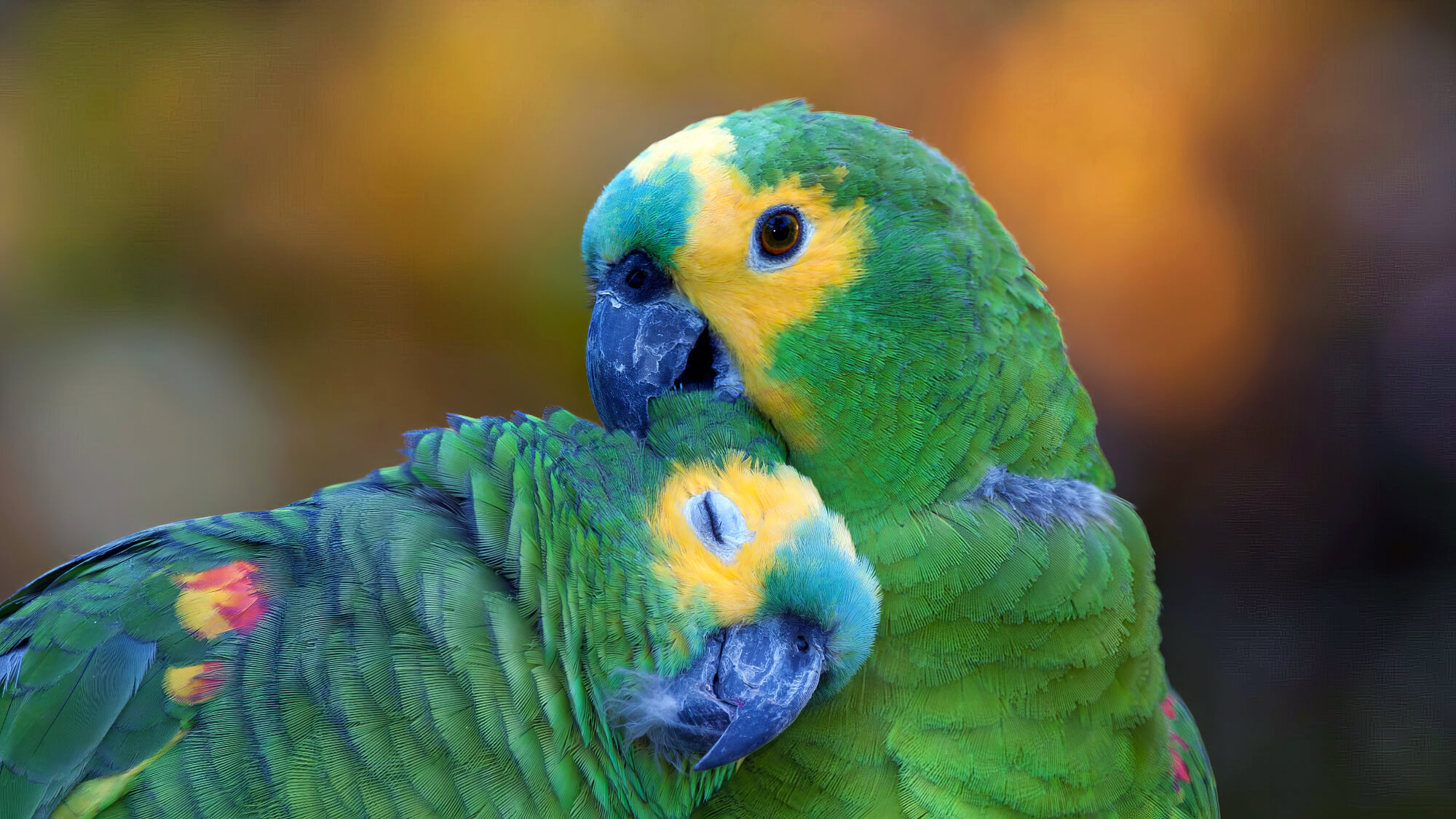
Companionship and Emotional Well-being
When you bring home a new bird to join your existing bird, you’re giving them both the opportunity to form a strong bond and become best friends.
As previously mentioned, parrots are social creatures, and having a feathered companion can provide them with the companionship they crave. Whether you have parakeets, cockatiels, or any of the many species of pet birds, having a mate can significantly improve their emotional well-being.
Watching two birds interact and form a close relationship can be incredibly sweet and rewarding for their human family members. They may preen each other’s feathers, feed each other, and even sleep side by side.
This bond can help reduce stress and anxiety in both birds, leading to a happier and healthier life.
Increased Physical Activity and Mental Stimulation
Having a bird separately can be lonely and boring. Still, when you introduce another bird into their life, you open up a whole new world of physical activity and mental stimulation.
The two birds will play together, chase each other around the room, and engage in fun activities like clicker training.
This increased physical activity is great for their overall health and can help prevent obesity and other health issues.
Additionally, the mental stimulation provided by having a playmate can keep their minds sharp and prevent boredom-related behavioural issues.
Reduced Stress and Behavioural Issues
Speaking of behavioural issues, having a feathered friend can actually help reduce stress and prevent problems like feather plucking and excessive screaming.
When a bird is alone, they may become anxious or depressed, leading to these types of behaviours.
However, when they have a companion to interact with, they are less likely to engage in these destructive habits.
Of course, it’s important to introduce the new bird gradually and supervise their interactions closely at first.
You don’t want any fights to break out over food or toys, and you’ll need to ensure they have enough space to spread their wings and move around freely.
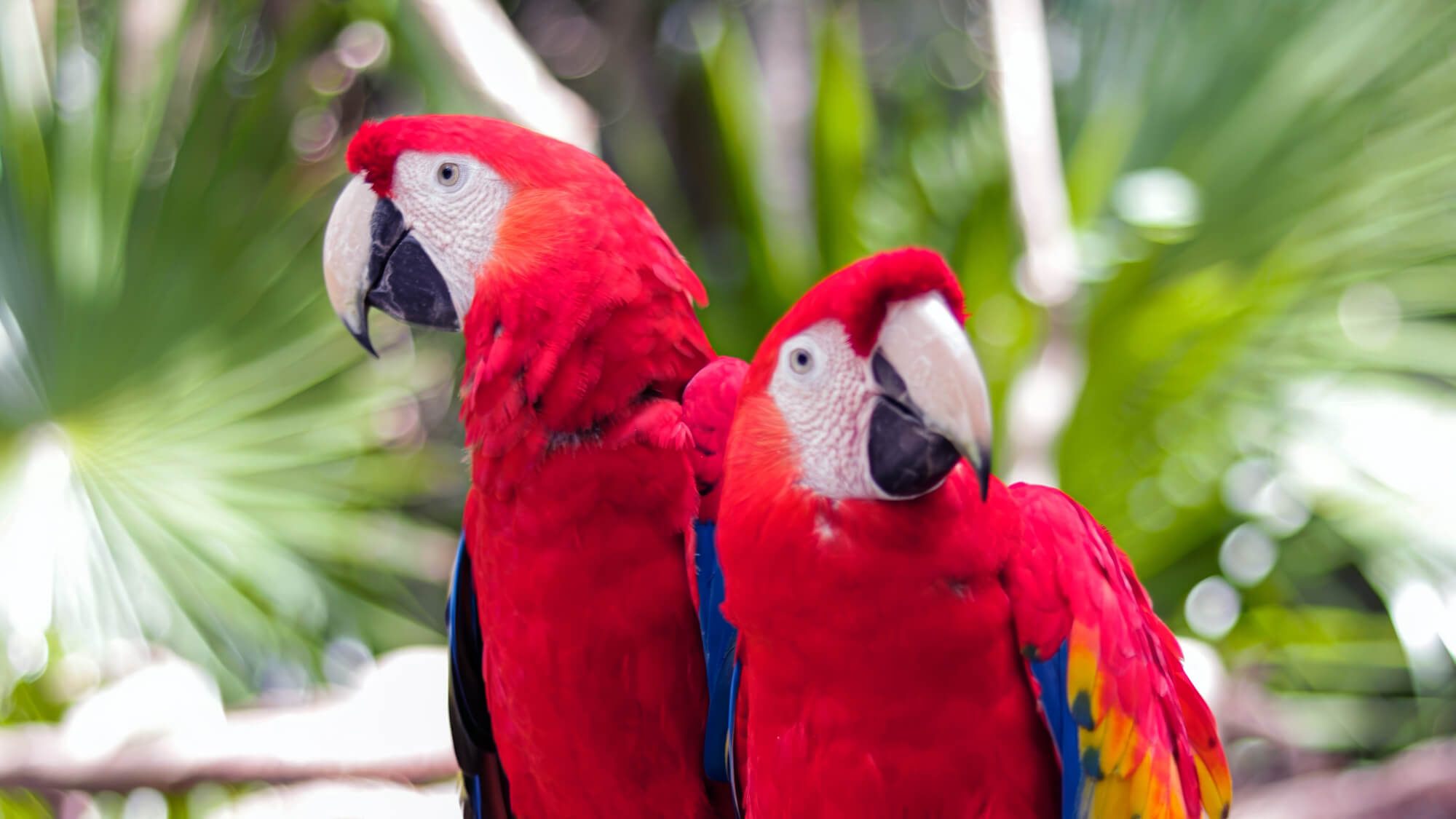
Improved Socialisation Skills
Introducing a young bird to an older bird can also help improve their socialisation skills.
The older bird can teach the younger one the ropes and help them learn how to interact with other birds and humans. This is especially important if you plan on adding more birds to your flock in the future.
By learning how to communicate and interact with other birds at a young age, your feathered friends will be better equipped to handle changes in flock dynamics and new additions to the family.
Watching them learn and grow together can be incredibly cute and rewarding for their human companions.
What Should You Think About When Getting a Parrot Playmate
1. Species Compatibility and Personality
When considering a playmate for your parrot, it’s crucial to factor in species compatibility and personality.
While some parrots thrive in the same cage as their best friend, others may prefer having their own space in the same room.
Researching your parrot’s species and observing their behaviour around other birds can help you determine if they’d do better with a mate or as a single bird.
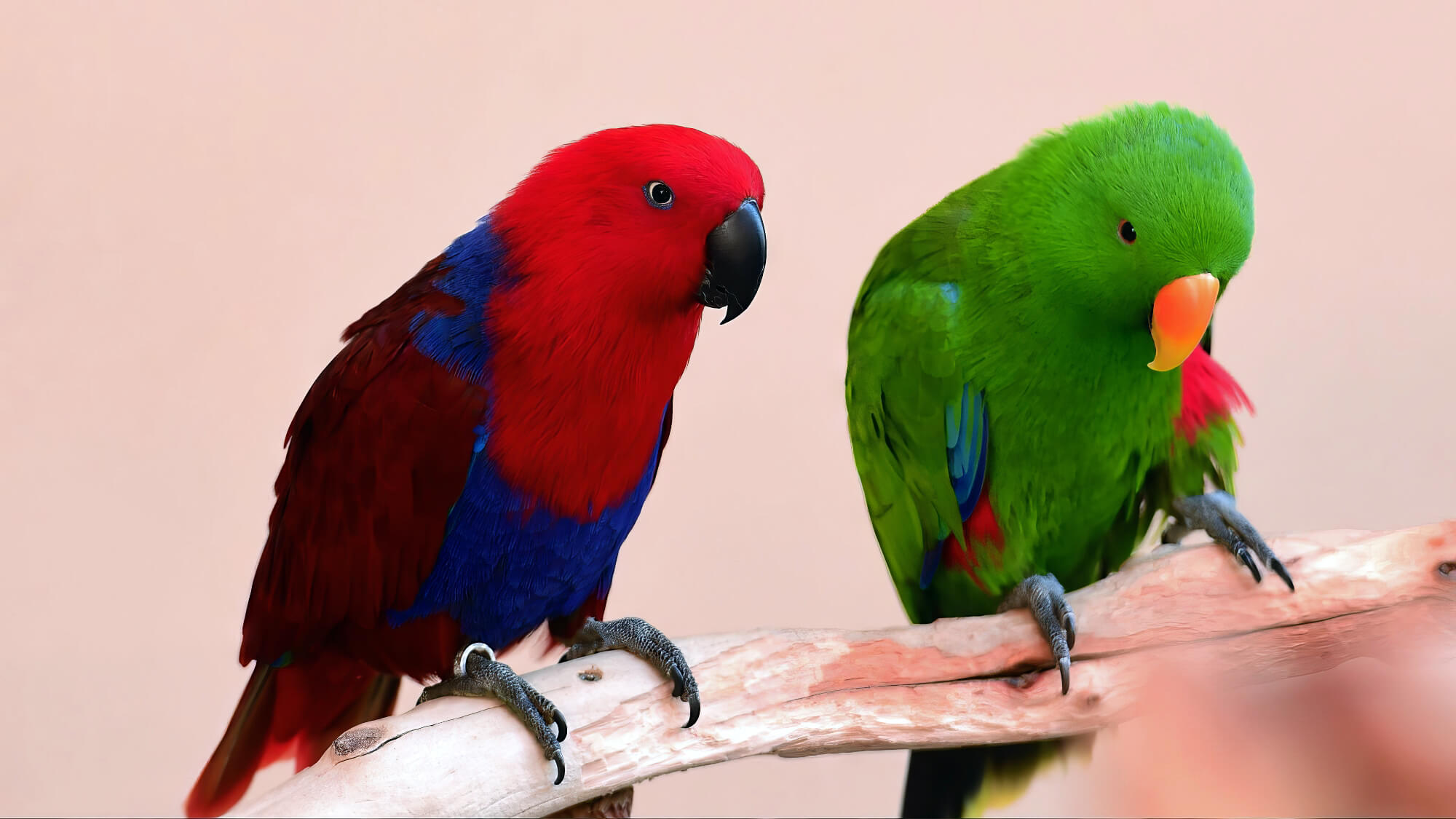
2. Age and Size of the Parrots
The age and size of the parrots are also important to keep in mind.
Introducing a new bird to your first bird’s cage can be challenging if there’s a significant size difference, as the larger one may become afraid or aggressive.
Introducing parrots of similar ages is generally easier, as they’re more likely to bond and become best friends.
3. Space Requirements and Cage Setup
Space requirements and cage setup are critical factors when getting a playmate for your parrot.
If you plan to keep both birds in one cage, ensure it’s spacious enough for them to move around comfortably and has plenty of perches, toys, and feeding stations.
However, if you opt for separate cages, make sure they’re in the same room so the birds can still interact and talk to each other.
4. Quarantine and Health Considerations
Quarantine and health considerations are crucial when introducing a new parrot to your home.
Even if you plan to keep the birds in the same room, it’s essential to quarantine the new bird for at least 30 days to ensure they’re healthy and free from diseases that could harm your first bird.
During this time, keep a close eye on both birds’ behaviour and health, watching for signs of illness or aggression, such as a change in appetite, lethargy, or excessive beak grinding.
Introducing a New Playmate to Your Parrot
When introducing a new playmate to your parrot, it’s essential to prepare the environment for the incoming bird.
Ensure that the cage is spacious enough to accommodate both birds comfortably, with ample perches, food, and water dishes.
Before the introduction, place the new bird’s cage near your current parrot’s cage, allowing them to see and hear each other without physical contact.
The gradual introduction process is crucial to prevent any potential conflicts or aggression between the birds.
Begin by letting them out of their cages in a controlled area, such as a bird-safe room, while closely monitoring their behaviour. If one bird appears aggressive or dominant, separate them and try again later.
It’s normal for birds to be cautious or even slightly apprehensive of each other initially.
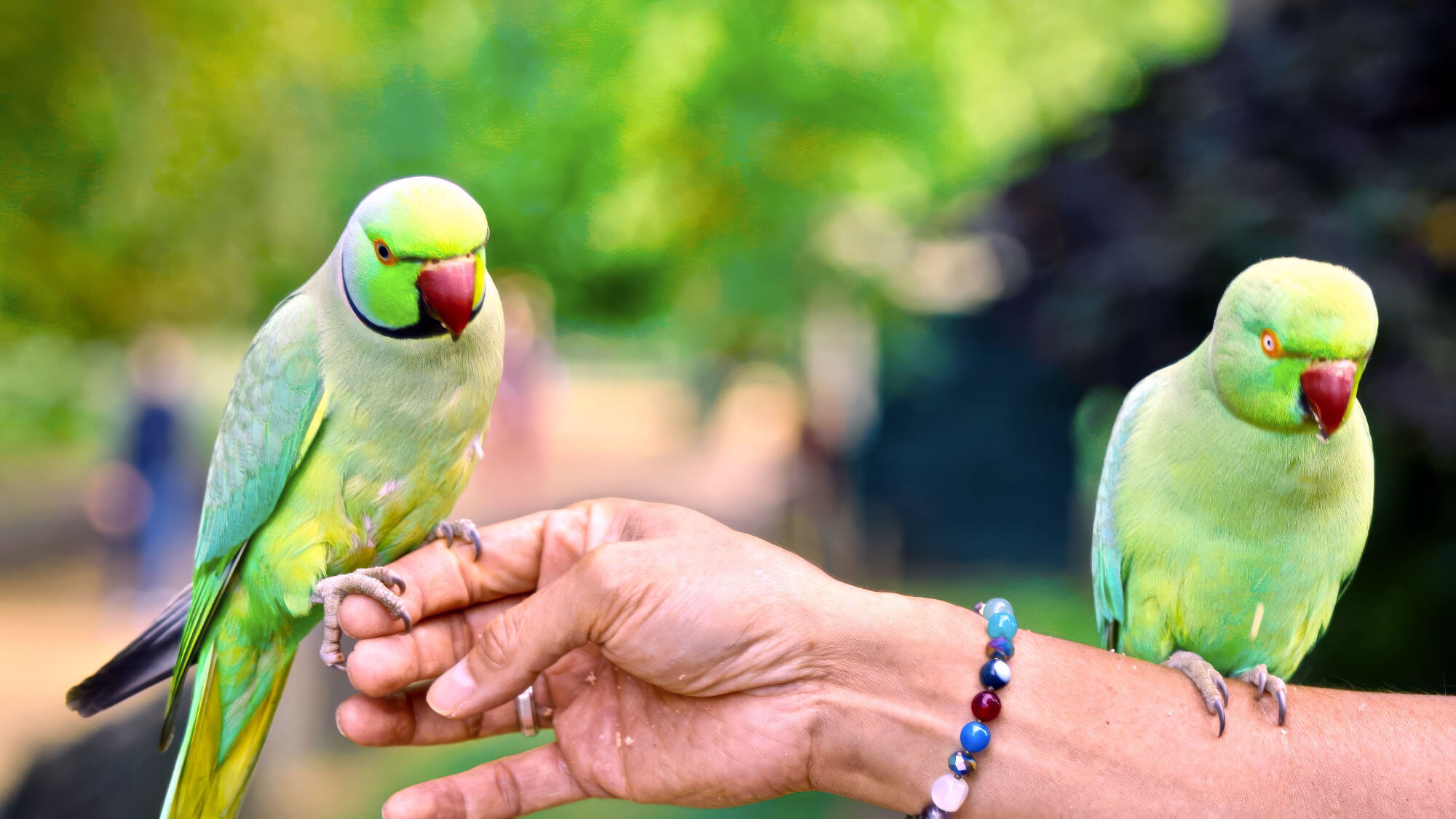
As the birds become more comfortable in each other’s presence, you can allow them to share a larger space, like a bird-proofed room in your house.
Observe how they interact and communicate, ensuring that neither bird is exhibiting signs of stress or aggression.
If you have concerns, separate them and consult with an avian veterinarian or experienced bird trainer.
It’s important to remember that not all birds will become instant friends. Some may prefer to co-exist peacefully in separate cages while still enjoying each other’s company.
This is particularly true for birds of different species, such as cockatiels and parakeets.
If you have a male and a female bird, be mindful of potential mating behaviours and ensure that you are prepared for the possibility of babies.
Throughout the introduction process, continue to provide your birds with a balanced diet, clean water, and a safe, enriching environment.
With patience, proper preparation, and careful monitoring, your pet parrots can form a strong bond and become delightful companions, filling your home with their lively chatter and playful antics.
Alternatives to Getting a Second Parrot
If you’re considering alternatives to getting a second parrot as a mate for your feathered friend, there are several options to keep your bird engaged and content.
Providing interactive toys and enrichment activities is a great way to keep your parrot mentally stimulated and prevent boredom. Puzzle feeders, foraging toys, and other bird-safe playthings can be rotated to maintain your pet’s interest.
Increasing human interaction and playtime is another fantastic way to bond with your parrot and fulfil their social needs.
Set aside dedicated time each day to interact with your feathered companion, whether it’s through training sessions, funny games, or simply hanging out together.
Parakeets and other birds are highly social creatures, so the more quality time you spend with them, the happier they’ll be.
Lastly, exploring bird playgroups or socialisation opportunities can provide your parrot with the chance to interact with other birds in a controlled setting.
While it’s important to be aware of potential health risks when introducing your pet to other birds, supervised playdates with well-socialised feathered friends can be a great way to satisfy your parrot’s social needs without the commitment of putting a second bird in your home.
Just remember, babies and other pets should be kept separate for everyone’s safety.
The Joys of a Multi-Parrot Household
Living with multiple parrots can greatly enhance your feathered friend’s quality of life. Parrot playmates offer companionship, mental stimulation, and opportunities for social interaction, which are crucial for their well-being.
Witnessing the joyful bonds and friendships that develop between your parrots is a truly rewarding experience.
Prioritising your parrot’s social needs is essential for their happiness and overall health.
If you’re considering getting a playmate for your parrot, carefully evaluate your circumstances and ensure you can provide a suitable environment for multiple birds.
By meeting your parrot’s social requirements, you’ll see a positive impact on their behaviour, contentment, and zest for life. Planet Pet offers a wide range of high-quality bird supplies to support your parrot’s health and enrichment.
Explore our selection of toys, perches, and nutritious foods designed to keep your feathered friends thriving. Contact us for further guidance on enhancing your parrot’s quality of life in a multi-parrot household.

